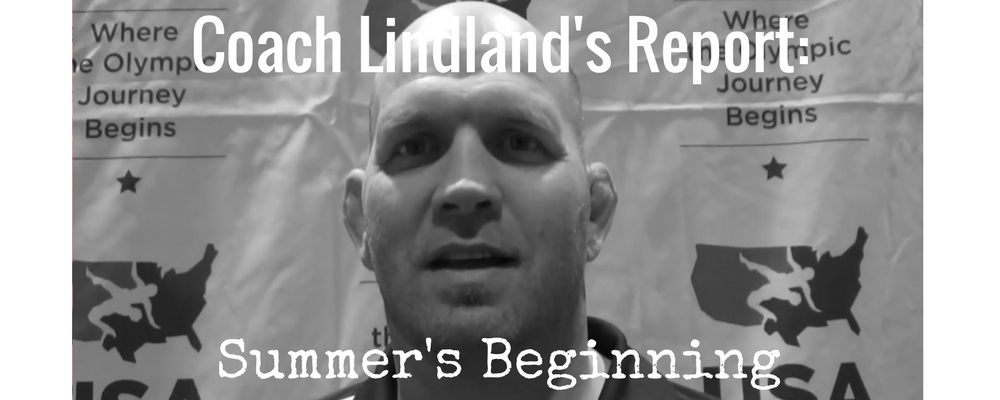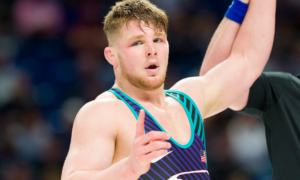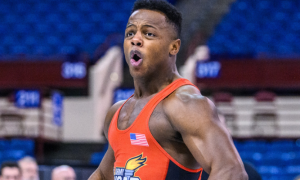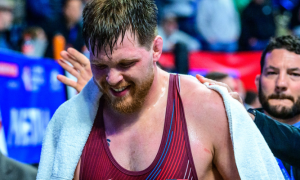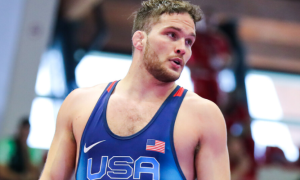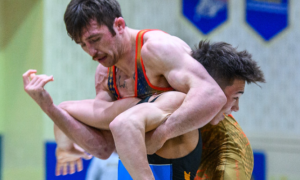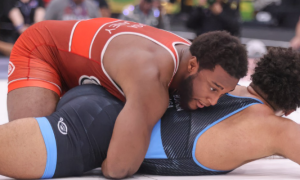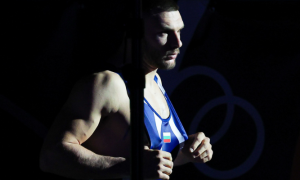Five Point Move is proud to host US Greco-Roman National Team Head Coach Matt Lindland every week for “Coach Lindland’s Report.” For fans and wrestlers looking for insights regarding the US Greco National Team, we ask Coach Lindland questions pertaining to recent events, training, and other topics surrounding the sport of Greco-Roman. If you have any questions you’d like us to ask going forward, let us know via Facebook, Twitter, or through our Contact page.
This week, we talk to US National Team head coach Matt Lindland while he is taking a well-deserved break in Portland, Oregon following a busy time for the Greco-Roman Seniors. “Base training camp” wrapped up last month but since then, it has been nonstop with the Tbilisi Grand Prix in Tbilisi, Georgia before the US boys began a two-week training camp in Budapest, Hungary last Wednesday. We get Coach Lindland’s perspective on the Tbilisi Grand Prix as a whole along with some insights regarding a few individual performances. In addition, the upcoming training phase for the Senior World Team and the new Go Greco USA Developmental Program’s first tour are also discussed. Let’s hit it.
5PM: Starting with Tbilisi, there were two medals out of ten guys, but there were also several very encouraging performances even in defeat. Outside of (Alex) Sancho and (Ben) Provisor picking up silvers, you had to have liked what you saw from the others, as well.
Coach Matt Lindland: I thought the guys competed very hard. I thought that for the most part we competed very smart, aside from Robby (Smith) being up 4-1 and reaching over his opponent’s head and getting ducked for four. He didn’t need that. But the guys wrestled smart and they wrestled hard. There are some adjustments that we saw from that tournament and that’s why we went there, to see where we can make improvements and where we can make adjustments heading into the World Championships. We saw a lot of bright spots, but we also saw some places where we can make adjustments, and that’s why the guys are over in Hungary. They stayed around in Europe for an extra two weeks to get that training in to make those adjustments. But I was super impressed.
How about Pat Smith’s match? Who wouldn’t have thought he would be carried through? You lose to a World champ, so you’re certain you’ll be carried through to the repechage. But closing that gap, I mean, last time they wrestled it was a tech fall, so we’re seeing huge improvements from our athletes and we’re closing those gaps, and that’s what we’ve been talking about through a lot of these conversations, What’s it going to take to close those gaps? And we’re starting to see the guys closing in on those and performing a lot better.
5PM: Getting back to Smith for a second, what I thought was really interesting is that in the first period against (Balint) Korpasi, Smith’s pressure-based attack was basically stonewalled. I don’t know what happened in between periods, whether it was something said to him from the corner or something he figured out on his own, but in the second he was much more successful in moving Korpasi around a lot more. He was different in the second and he lost 2-0 on two passivity points. What do you say to him after a bout like that?
ML: Well, I can tell you what we said in the corner, which was, “You’re doing the right stuff. Keep doing it. Stick with your plan, it’s going to work.” Like we talked about earlier, closing that gap. He got tech’ed before wrestling the same opponent. Pat didn’t give up a single point other than what the officials gave him (Korpasi) and he was very close to scoring himself. We’re struggling, not just with Pat Smith but Sancho in the finals, we’re struggling with guys who do not want to open up and wrestle. They don’t want to take chances, perform, and compete. They want to let the referees decide the match, they want to put in the referee’s hands. As the coach of the United States team, I’m not willing to do that because I don’t think we’re going to win those kinds of matches. I don’t think we’re going to get those calls. We’re going to have to take it away from the officials and score.
So I told Pat, “Keep doing what you’re doing, the pressure looks good. Start opening up and looking for more attacks.” He did, but for some reason his opponent was blocking out and we didn’t get the passivity calls. But again — we can’t leave it up to the officials, we have to score. So, I feel really confident with Pat competing with that same opponent again. He brought the score down from 8-0 to 2-0, and both of those points were given to his opponent by the official because they are mandated. They are mandated to make sure someone’s got a point on the board. Just purely that. I did feel like Pat was doing all of the attacking, he was making all of the attempts to actually try to wrestle. But there is something the officials are seeing where they are not giving us the calls, and I think that’s just going to happen. I don’t think it’s tactical, I don’t think it’s technical, I just think that we’re Americans and…let’s be honest: the rest of the world has every right to hate us. We live in the freest country in the world, it’s the greatest nation in the world. I mean, why wouldn’t everyone else hate us? We’ve got to go out and smash people and do what we’re capable of doing.
5PM: Especially in the current climate, it looks like that is the only way the Americans can win, there has to be no-doubt-about-it points being scored.
ML: I agree wholeheartedly and that is what we are going to continue to impress upon our athletes leading into the World Championships — take risks, try things, and go out swinging. If you’re going to lose, lose because you were trying something. That goes back to what Robby was doing. He was attacking. He was up 4-1. He didn’t need to attack. So let’s be a little more tactical and technical about those attacks when we have the lead in the last period and we’re closing the match out. I get it — Robby wanted to put a stamp on that match. He didn’t want to just beat him by three points, he wanted to beat him by eight points. But you’ve got to also be a little tactical about that. That being said, I love the attitude and that he was all about putting points on the board and scoring.
5PM: Sancho didn’t make the World Team but once again wrestled very well in an overseas tournament, it’s his third straight strong performance and second straight international final. His top game was something to behold in his first two bouts, four straight or straddle lifts for 14 points.
ML: They were kind of straight/straddle…
5PM: Right, his hybrid.
ML: It’s definitely his. You know what, that’s what I love about this sport and martial arts in general, that you can create your own art, and Alex Sancho is a true martial artist. That is complete art-in-motion that we’re seeing out of him when he competes. He’s going to be such an asset for the team this year helping prepare Ellis (Coleman) and Pat Smith for the World Championships. He wrestles…he wrestles, period (laughs). He goes out there and he’s in your face trying to score. That is going to force our World Team members to step up what they are doing and he is going to be essential for our preparation and training. I was really glad that the New York AC sent him over to be a part of this, the tournament and the training camp. Because we don’t know who is going to be our guy in 2020 and that is what we are gearing up towards, so we want to have all of those guys prepared and fighting one another in the room.
It’s so great to watch guys like Sancho and Ellis Coleman working together. These are guys who just battled for their dream. This was their dream, to represent the United States at the World Championships. Alex didn’t make the team, he fell short to Ellis. Right now at camp, he was like, “What does Ellis need to prepare? How can I help him?” I’m fortunate to have guys like him who are such excellent leaders part of this program. Guys like Alex Sancho who understand, Okay, this wasn’t my year, I didn’t win at the Trials. But I’m here to help my teammates even though they are competitors a couple times a year. Maybe these guys compete even more than that, you know? New York and then Las Vegas a couple of times. But I am really grateful to have guys like Alex Sancho on our team to help us take on the rest of the world.
5PM: Coleman was right up there and even though he didn’t medal, you could make the argument that his was a great showing nonetheless. Maybe this tournament as a whole wasn’t a pressure situation, it was more a test, more of a see-where-you’re-at sort of thing. But going by what you saw in Georgia out of Ellis, are you confident with where he is currently and is he on track for where he needs to be for the summer?
Coach Matt Lindland: First and foremost, these guys put pressure on themselves every time out. They want to win. Whether it’s the World Championships or not, they want to win and make a statement every time. So that pressure is still there for all of our athletes when they are competing, it’s just how they handle that pressure. But Ellis, certainly, he is doing a lot of things right. There are a couple of adjustments that we have to make. I feel like every time he gets to a good position, he lets the pressure off of his opponent by stepping back and trying to reset when he instead should be keeping the pressure on his opponent, making him have to reset his position. He is letting them off the hook. He’s letting them relax.
When you don’t have your hands on that guy, when you don’t have to your body against him, that one moment when you step away is the one moment when he is relaxing, resting, and recovering. But if you keep that constant pressure on your opponent and stay close to him, Ellis is that type of athlete who at any moment can hit a four-point or five-point throw. But those moments when he is stepping away and releasing the pressure, he is not close enough to attack his opponents. Those are small adjustments, but we’ve got to stay consistent with those.
5PM: Provisor had some rough, physical matches, his style dictates as such. He also got a run at one of the better guys in the world at his weight. Is something like that an important litmus test at this point, or do you not take too much from it?
ML: No, I think it is incredible. I think Ben had an incredible performance and I’m not just talking about his medal and the Pan Ams, winning gold over there. It was the way he competed. He was offensive, he was aggressive, he was trying to score. We’ve seen Ben in the past kind of sit back and wait for par terre. He’s hard to turn, he gets on top and he knows he can gut you. These rules do not lend themselves to that anymore. We’ve talked about this a few times, but it’s these younger athletes, the Juniors and Cadets, who have been competing under this rule-set and they have the upperhand because they know they don’t have the luxury to wait to get on top. We’ve been trying to impress that upon Ben since before Rio that, We want to see you scoring from your feet. He really took that match to heart, that match he lost to the Uzbek (Rustam) Assakalov there. He felt like, This guy was silver in the world last year and I should have beaten him. I could have beaten him and I was beating him and I let it slip away. What’s it going to take, Coach, to where I am winning those kinds of matches on a consistent basis? My answer was, “Attack. Attack, attack, attack, and keep attacking. Force your positions and attack from those positions.” We’re seeing him do that and that’s what it is going to take.
Ben is a super specimen. He’s a physical athlete. That guy is one strong dude (laughs). I mean, he is a physically strong, capable athlete who has been coached by some of the best guys in the country since he was a youth, and traveling overseas. He’s had international experience for years. He knows what it takes. But knowing what it takes and actually doing those things are two different concepts, and Ben is starting to do them now. We’re seeing him attack and off of his attacks, score. Plus, he’s got such excellent position to where if he’s scoring and he has a lead on you, he’s not giving that up.
5PM: The talk about the Hungarian camp going in was that it was going to be a hefty dose of intense live wrestling, which makes this question a two parter. First, how do you apply the intensity from this camp to the training phase that begins once everyone comes home and regroups? Second, how is preparing for this year’s World Championships different from the preparation for Rio, if it even is?
Coach Matt Lindland: I can certainly tell you, we got to Hungary and the first two days were ours. The first day, we rested. The second day, we went outside and played a game, did a circuit with some bands and some partner exercises, but we didn’t do any combat. But when we got on the mat for camp, the first day consisted of eight ten-minute go’s (laughs). It was just like, Wow. Welcome to Hungary, guys. And the go’s were four minutes on your feet, 30-30-30-30 par terre, four minutes on your feet, 30-30-30-30 par terre. So we incorporated a lot of par terre wrestling, we incorporated a lot of feet wrestling, and I remember we actually did this same workout with the Hungarians in December and I saw the pace they were going at. It’s a lot of volume, but you’ve got to pace yourself. And a guy like Pat Smith doesn’t have that, a lot of pacing himself (laughs). I guess he just goes. I don’t know if there is an off-button for him and these Hungarians were not ready for that kind of intensity along with that kind of volume. So when they are doing that kind of volume, they are a lot more relaxed, they are looking to hold their positions, get to the guy, and then one or two explosive attacks during those four minutes. I mean literally, one or two explosive attacks and then back to holding position. Then you see someone like Pat who is attacking, attacking, attacking and eventually, these guys break. But we’ve got to shorten that up. We have to be able to break these guys in six minutes. Honestly, I think we’re getting there.
But the second part of that question as to what’s different with this year’s preparation? Well, honestly, the rules have changed and therefore, the strategies have changed. For sure. I’ve always wanted to see our athletes attacking and scoring on their feet, not leaving it in the officials’ hands, not waiting for the par terre — just take them down and score, like Sancho does. Take the guy down, finish the match on top. You only need one chance on top to finish the match. But I think the volume we are putting into scoring on our feet versus the amount of time we’ll be spending in par terre is going to be changing a little bit. We could still get taken down, we still have to D-up in par terre, we can’t give up that turn. We can’t let that guy finish the match on us just because he got a two-point takedown and let that be the end of the match. You can come back from a two-point takedown. You can come back from a four-point takedown. But you can’t come back if you’re relaxed on the bottom and letting the guy turn you.
So I think that is the big difference we are really going to impress upon our athletes, getting them to score on their feet. Whether it is in drilling situations doing a lot of high-paced, high-intensity throws or short, intense :30 go’s where you have to score, you have to score. We’re putting those plans together. As soon as Momir (Petković) gets back, Coach Herb (House) gets back, we’re going to sit down and discuss it. It’s nice when at least one of the World Team coaches lives in Colorado Springs and is really engaged with our athletes. It’s nice that the Army coaches, we have two WCAP athletes on the team, live right in town and can sit down with them and discuss what we want to accomplish with these camps and put these plans together and run the camps.
5PM: Counting 2013, this is your fourth World-level tournament as a coach in some capacity. Does the lead up feel like it goes really fast to you? Also, how does having your team selected in April play into it all and the advantages you feel that provides?
ML: I think in the past it has felt a little more rushed, so I think you’re right, having the team selected while everyone else is figuring out right now where they are going to get their pre-Worlds tour in. Because the Golden Grand Prix in Baku, we just got cancelled. We’re not going to have visas in time and I had already intended on not taking our number one’s there for the simple reason that I didn’t know who was going to be qualified yet. And now we still don’t know who’s qualified, and that tournament is right around the corner. There is going to literally be no chance to get visas. Our women and freestyle teams are switching things up, they are probably going to Spain or some other tournament to get some matches in.
I knew way in advance that Tbilisi was where we were going to go to get our pre-World tournament. It was the same weekend freestyle was still selecting their team. We had a chance to go to the Pan Ams, train, and then go to our pre-World tournament while other teams were still in the midst of their selection processes. So for me, it doesn’t feel as rushed this year. I am back in Portland right now with my family taking a couple of days off. My daughter graduated from college, so I left Budapest a little early to come back and do this. I got to be there for the first week of camp, but the second week I bowed out. And I’m not panicked about it (laughs). I’m not like, Oh my God, this is coming up really fast. It is coming up fast, it is literally just around the corner. But the plan is in place, the guys are on track, they are doing the right stuff, and we just need to make some lifestyle adjustments in there. They need to realize that it is urgent, the World Championships are right around the corner, so let’s clean up our diets, let’s focus on making the right choices lifestyle-wise. The training plans are in place, we’ve got great training partners, we have all the flights booked for our camp already, and we know who is going to be there. It’s going to happen. But it isn’t rushed, it isn’t hurried, and it’s not panicked. The plan is in place and it will be executed. I’m looking forward to it.
5PM: Right now in Croatia and wrapping up their first camp after an event last weekend is the new Go Greco USA Developmental Program, which is mostly comprised of Cadets, though there is a Schoolboy-aged wrestler on the tour. Since you’re certainly a proponent of indoctrinating the youth when it comes to international training opportunities, how big of a step forward for Greco in the US do you think this is?
Coach Matt Lindland: I think it is a critical step in the right direction for the development of Greco-Roman wrestling in the United States. These young athletes get a chance to go over to Europe for two weeks and experience what the rest of the world is doing. Their eyes are going to be opened up and they’ll realize, Wow, there is a big world out there. We’re in this little fishbowl in the United States where we think the NCAA tournament is the biggest tournament in the world, and it’s just not. It’s not even a style anyone else in the world competes in. Wow, we’re the best in our own style. It’s kind of cute. But actually getting our Cadets, and that is the age to capture these guys, and I love the language you used, to “indoctrinate” them into international Greco-Roman wrestling. You know, maybe we lose a couple of these guys to the folkstyle system but frankly, maybe they aren’t the ones we want anyway. We want the guys who are passionate about it, who love to be able to challenge themselves at the international level, love the art of Greco-Roman wrestling and want to excel at it. And it’s not an art that is appreciated by as many in this country, but the ones who do, those are the ones we’re going to focus on. The guys who are making the effort to get overseas, making efforts to compete and attend training camps internationally. Those are the athletes who are going to get invited to the (Olympic) Training Center.
I am so blessed to have so many great volunteer coaches in our country. Guys like Shawn Sheldon and Lucas Steldt who are donating their time and taking these athletes over there. Then guys like Andy Cook and Zac Dominguez — there are just a plethora of coaches who have sent guys on this trip and maybe next year they will be the coaches who will be taking these athletes overseas instead of Lucas. Maybe it will be Andy or Zac. I’ve got a lot of great coaches who are willing to invest their time into these athletes and invest their time helping our Greco-Roman program get to where we need to be, and this is certainly a step in the right direction. For me, when people were calling and saying, I’m seeing this stuff now, we want to go over! I’m like, Well hey, that trip is full. If you want to do that, do it. Don’t wait until the guys are already in Europe to start inquiring about it. There is no time like now to start figuring it out. We can put a link on this article to the UWW events calendar. Are you a Cadet? Well then, that’s where you should be wrestling. Are you a Junior? This is where you should be wrestling.
The difference is in the mindset. Are you looking at the domestic calendar? Are you looking into the Cadet Duals in York, Pennsylvania? Or are you going to Serbia and Zagreb? It’s a different level in terms of goals, it’s a different mindset, that’s all it is. Do you want to be the best in the world? Or do you just want to be the best in the country? I feel like if you want to be the best in the world, you’re going to be the best in the country. That’s a given. I remember when I was an athlete, I was training and I never wanted to wrestle in the US Opens. I don’t want to wrestle in the Open, but I guess I have to. I don’t want to wrestle in the Trials, but I guess I have to. I wanted to wrestle overseas. I wanted to chase down the best guys in the world. If this guy was ranked in the top ten in the world, I was going to find out where he was competing and in what country, and I was going to get myself over there. Being number one in the country was going to take care of itself. I think that is the direction we’re going to head in with these Cadets and some of the Juniors. We haven’t seen this before to where we’re taking young athletes to international competition and exposing them to the world-level. These guys in Serbia and Croatia don’t do folkstyle. They do not even do freestyle. They are Greco-Roman wrestlers and that’s who we have to go chase down. You have to chase down the best Cadets in the world if you’re a Cadet. If you’re a Junior, then you have to go chase down the best Juniors in the world. And we’re heading in that direction.
It never feels like it is happening fast enough, but I certainly feel the momentum of the pendulum swinging. I think other people are starting to see that, as well, and next year when we put a trip out there for Cadets and Juniors to go to, I think more people are going to jump on it faster. Because now it’s real. It’s not just something we’re talking about, it’s something we do. It’s what we do. If you want to be the best in the world, you don’t talk about it. You get overseas, you compete, and you train.
Be sure to follow Coach Matt Lindland on Facebook, Twitter, and his official blog for updates on the US Greco Roman Wrestling program heading into the new competitive cycle.
SUBSCRIBE TO THE FIVE POINT MOVE PODCAST
iTunes | Stitcher | Spreaker | Google Play Music | RSS

Notice: Trying to get property 'term_id' of non-object in /home/fivepointwp/webapps/fivepointwp/wp-content/themes/flex-mag/functions.php on line 999

